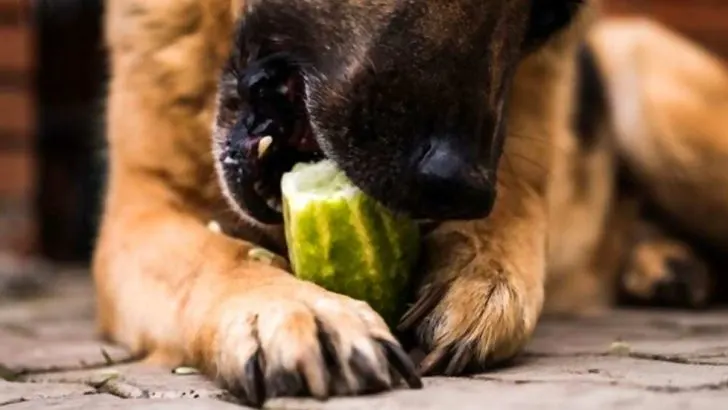Your dog is a part of your family, and it’s only normal that you share food with him or her. That doesn’t actually mean you should share everything with your pet.
Human food can be hazardous to your canine family member’s health, so you should always be careful before you let your dog enjoy your dinner with you.
Although healthy for humans, vegetables can sometimes be harmful to dogs. There are many veggies that your dog should never eat; some of them can cause significant problems. That’s why we are here to let you know which veggies are safe and which ones are to be avoided at all costs.
Today we will answer the question: Can dogs eat cucumber? Besides that, you will also find out whether cucumbers have any health benefits or not. Read on to learn all this and much more!
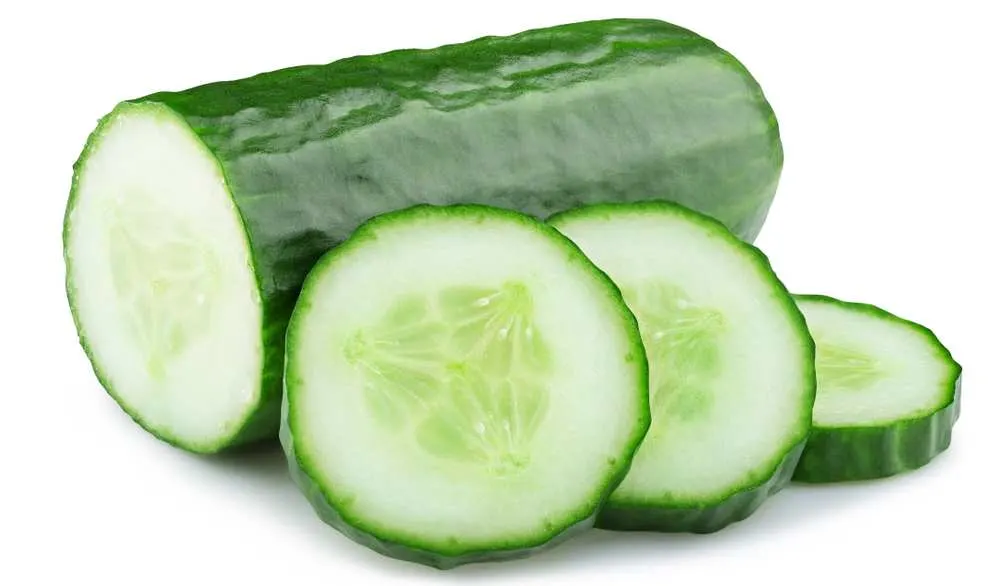
Can Dogs Eat Cucumbers?
Without further ado, the answer to this question is: Yes, dogs can eat cucumbers. Plain cucumbers are safe for your dog. You can use them to treat your canine friend without any worries for his or her health, just don’t overdo it.
There are 2 health risks for your dog that may occur from cucumbers: choking as well as overeating.
To prevent your dog from choking when eating cucumbers, you need to help him out by cutting the cucumbers into small chunks, especially if you have a little dog. This will make the cucumber pieces small enough for your pet to swallow them safely without the danger of the pieces clogging the airways. Never give your dog a whole cucumber!
As with any other food, if you feed your dog too many cucumbers, he or she will have some stomach problems. Your pup won’t have severe issues in most cases, but having too much food will provoke gastrointestinal upset in your dog. This is especially true if it’s not used to eating cucumbers often.
You should slowly implement cucumbers in your pup’s diet. If you’re wondering how much cucumber is enough, here is a general rule vets recommend that you can follow – snacks and treats should make up only about 10 percent of a dog’s daily diet.
This means that if you have a labrador retriever, for example, you can feed your pet more snacks than someone who owns a corgi.
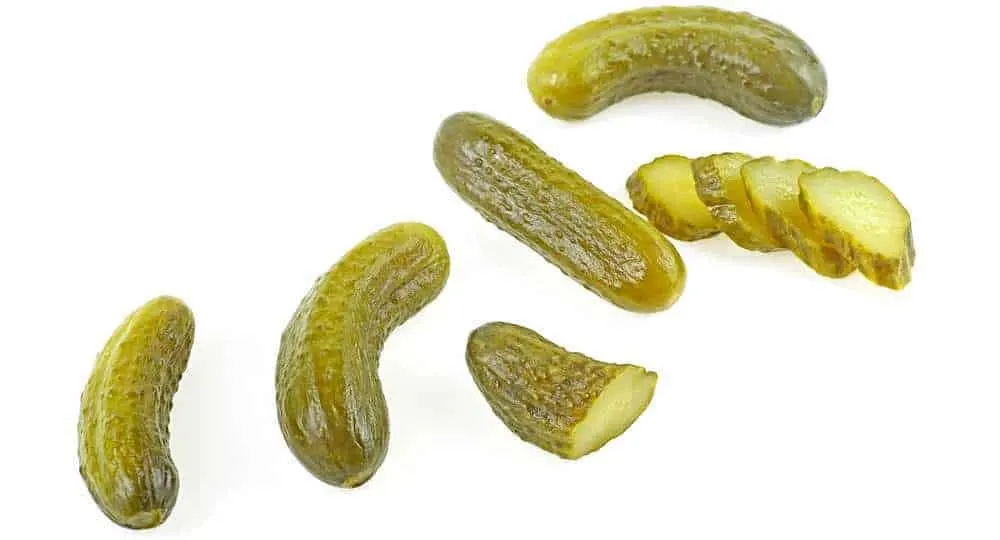
What About Pickles?
Since pickles are made from cucumbers, you might think pickles are safe for your dog just like plain cucumbers, right? Well, you’d be wrong to think that.
Pickles are dangerous for your pet because of the way they are made. The various additives and salt used for pickling cucumbers pose a significant threat to your four-legged friend.
If your dog eats too much salt, it can cause severe problems. Your pet can become dehydrated and also develop nausea, diarrhea, and loss of balance.
Some pickles are made with onions, which are extremely toxic to canines. They can develop anemia, which may cause even bigger problems down the line.
Although a small piece of a pickle probably won’t cause your dog harm, it’s easier to avoid them altogether. Don’t feed your pet any type of pickle; just stick to plain cucumbers. They have the same nutrients, without the additives that are a risk to your dog’s health.
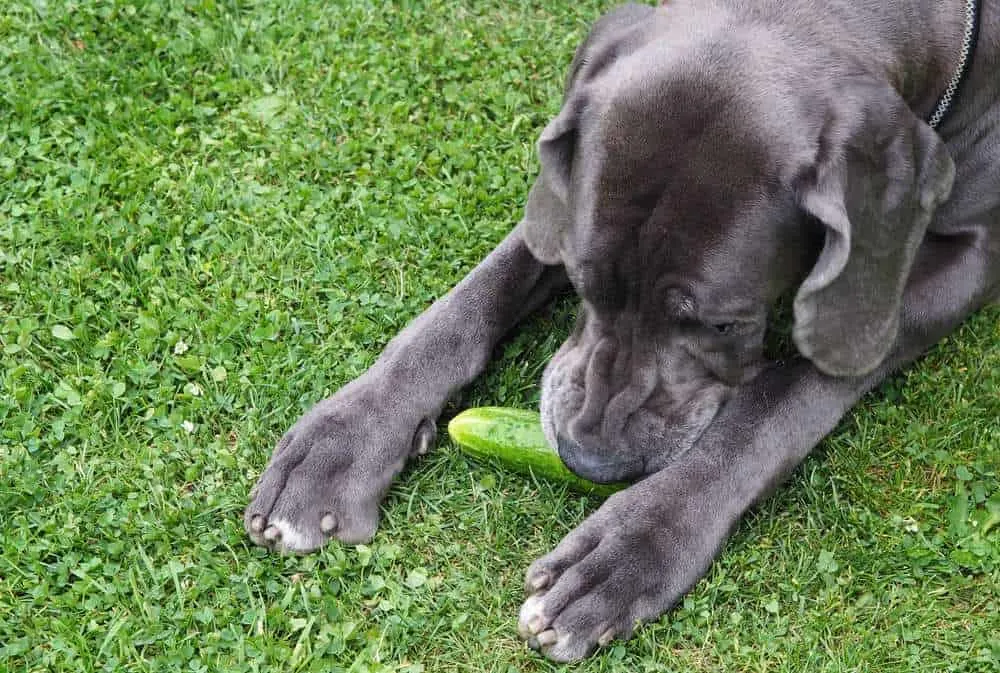
A Few Interesting Facts About Cucumbers
Cucumbers, scientifically known as Cucumis Sativus, belong to the gourd family, along with watermelons, squash, pumpkins, and zucchini.
They originally come from South Asia, specifically India, but today they are cultivated around the world. Cucumbers have been grown for at least 3000 years. There are records of Roman, and later French and English rulers producing this vegetable for their own court.
Romans used cucumbers to treat scorpion stings and bad eyesight too.
There are 3 main varieties of cucumbers:
- Slicing – this is the plain green cucumber. It’s actually eaten before it ripens. That’s because when it’s ripe, it gets a bitter taste and isn’t as tasty as it is when it’s green.
They have smooth and thick skin.
- Pickling – These are made by putting plain cucumbers into vinegar, brine, sugar, and other seasonings. After staying in the liquid for some time, the pickled cucumber gets a distinctive sour taste. Unlike slicing, these have bumpy skin, and their color varies from yellow to dark green.
- Gherkins – are a type of pickled cucumbers. These are special in the sense that they are small in size, usually 1-5 inches. These cucumbers also have bumpy skin.
- Burpless – These cucumbers have a sweet taste and thinner skin than the other varieties of cucumber. They are almost seedless, and their skin is quite delicate. They get their name because of the lack of seeds, which give some people gas.
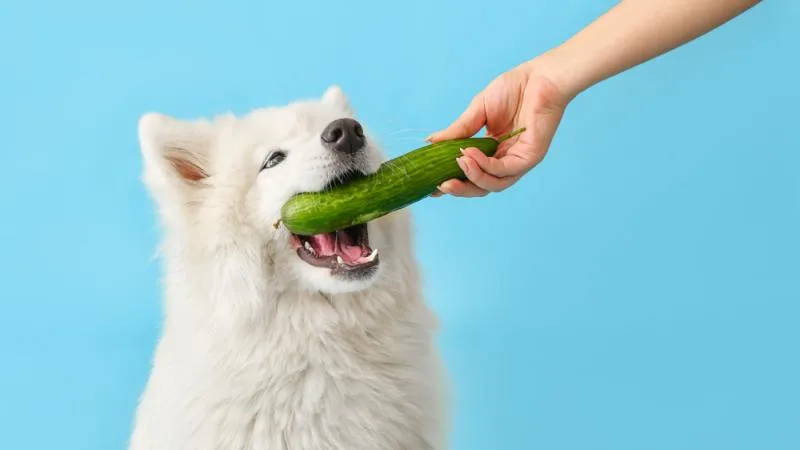
Are Cucumbers Healthy For My Dog?
Cucumbers are actually very healthy for both you and your pet. Their main benefit is that they have a low caloric value. One serving of 100 grams (3 and a half ounces) is made up of 95% water, and that’s including the thick peel.
It’s a low-calorie food, providing 16 calories per serving. This means it’s ideal if your pet is overweight and trying to get lean and fit. It’s a great substitute for other high-calorie snacks.
The high water content also means that cucumbers are great for a refreshing treat during the hot summer days. Your dog will stay hydrated and refreshed after those long walks and runs.
Apart from this, cucumbers are full of vitamin K, which is important for healthy bones and blood. Vitamin K deficiency can prevent blood clotting, which can be a major issue in some situations.
Cucumbers are also packed with vitamins B and C, along with other important minerals. These include potassium, magnesium, and copper, which are all needed to keep your four-legged friend healthy and happy.
Feeding your dog cucumbers will also help his or her oral hygiene. Cucumbers have phytochemicals that kill bacteria, which are the cause of bad breath. This doesn’t mean you can stop brushing your pet’s teeth!
One other benefit of cucumbers is the antioxidants they contain. These molecules help your pet’s body fight off infections and inflammations.
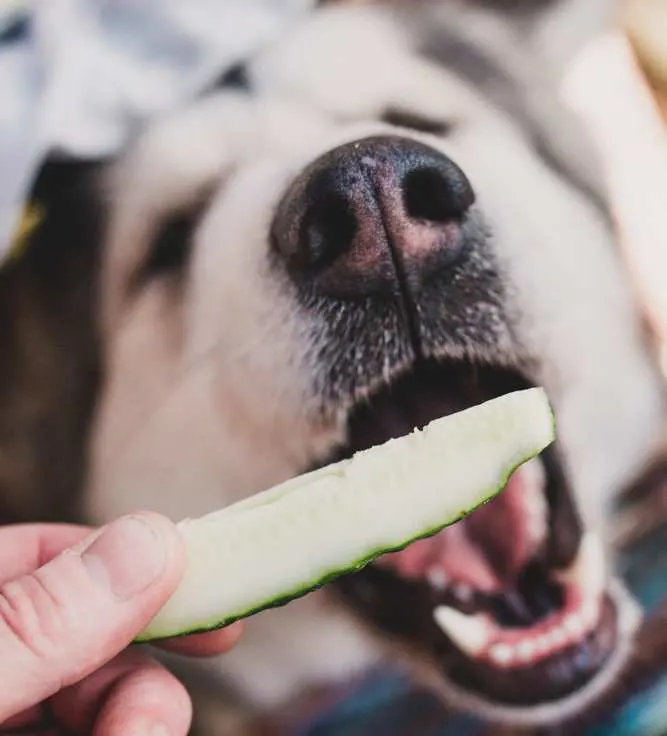
How To Safely Feed My Dog Cucumbers?
Before introducing any new food to your dog’s diet, you should talk to your veterinarian. He will tell you whether you should start giving your pet a new type of food, and how much your pet can eat.
Just like with any other vegetable, cucumbers should be washed under running water before you feed them to your pup.
You should cut the cucumber into small slices, depending on your dog’s size, of course. If you just give your dog a whole cucumber to chew on, there is a possibility your pet can start choking, and you definitely want to avoid that.
Try to peel off the skin from the cucumber and remove the seeds. Your pup’s tummy can’t digest these parts of the cucumber, so they may cause stomach discomfort. The skin and seeds are not dangerous, but there’s no need for your dog to have a stomach ache.
As we mentioned above, never give your dog pickled cucumbers! Also, don’t go overboard with the plain ones; too much can cause diarrhea and other stomach problems.
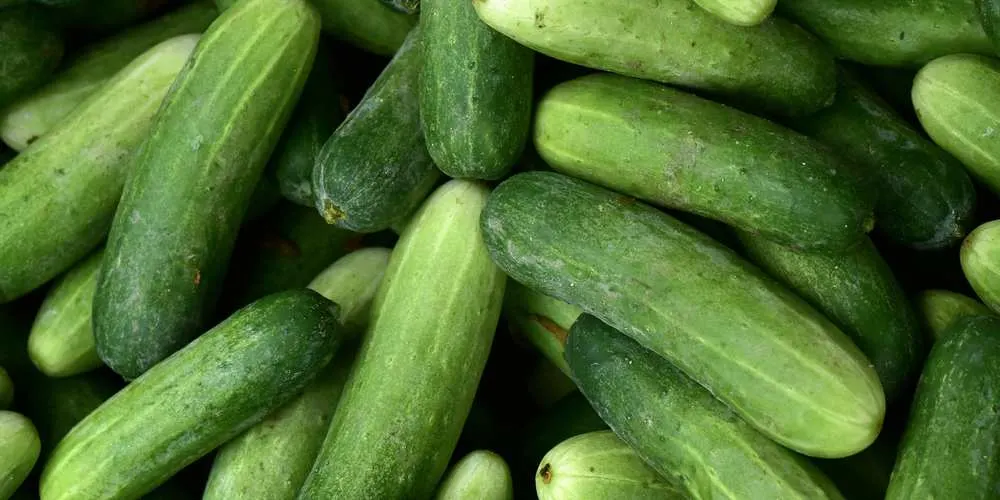
Let’s Wrap Things Up
Cucumbers are a refreshing, healthy treat for your beloved pet, there’s no doubt about that. They are great treats for the summertime and will help your dog stay hydrated in the heat.
They are also great to use as a snack if your dog needs to lose some weight because of their low-calorie count. Not only that, cucumbers are rich in important vitamins, minerals, and antioxidants.
Be sure to avoid pickled cucumbers; they are a health hazard for your canine friend. Just stick with plain cucumbers, and you have nothing to worry about.
As with any other food, don’t go overboard with the cucumbers you give your pet. Your dog should still be eating primarily dog food.
Always be sure to wash the cucumbers and peel off the skin and take out the seeds. This way, your dog will fully enjoy his treat without his stomach acting up.
So the next time you are cutting up a cucumber for yourself and see your dog looking at you asking for some too, feel free to share the refreshing snack with him without any worries!
Learn More: What Can Dogs Eat? A Comprehensive List Of Dog-safe Foods

